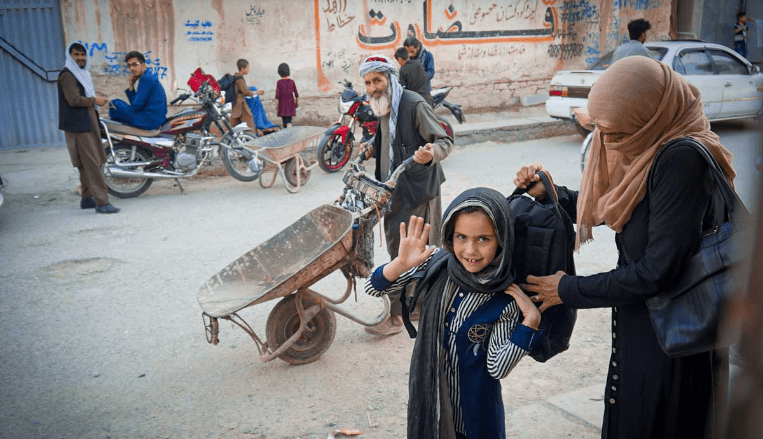
Pakistan now sees the huge refugee movement of Afghans as a threat to societal and national security. Pak’s plan to deport foreign nationals with no valid visas has affected the Afghan refugees majorly. Around 2 million undocumented refugees are now forced to go back to their country despite the dangerous conditions back in Afghanistan.
Reemergence of Taliban
The Taliban is a faction that emerged in Afghanistan, as an aftermath of the Afghan war which was an internal conflict between the Afghan communist government and anti-communist Islamic groups. It emerged due to the government’s inability to maintain order and peace in Afghanistan after the war and held the nation captive under its arch-conservative totalitarian rule from 1996 to 2001 until the US attacked and ousted their regime. The Taliban regained control back in 2021, in Kabul and now have the entire nation under their control.
Afghan Refugee in Pakistan
This has instilled great fear and intimidation in the lives of Afghan civilians. Women and children have been migrating to various nations to escape war, violence and poverty caused by the Taliban government. Around 6.4 million civilians have sought refuge in different countries and 23.7 million Afghans, mainly women and children, which make up half of the entire Afghan population are seeking protection in the state. A huge number have sought refuge in one of their neighbouring nations, Pakistan, with almost 1.35 million refugees, including men women and children, with more than 8 lakh Afghan refugees remaining undocumented.
A National Security Concern
Pakistan has been accommodating and hosting refugees from Afghanistan and other nations at risk for decades and this has cost Pakistan in many ways, national and societal security is breached quite often, especially the dealings with the border crossing. Pakistan’s stability has been compromised and pressurized because of Afghan nationals crossing borders illegally without proper visas leading to various conflicts within the nation, including terrorism and also involved in several suicide attacks on Pakistan security forces along the frontier. Pakistan, wanting to prioritize the nation’s safety, decided to repatriate the Afghan refugees (‘Illegal Foreigners’ Repatriation Plan), sending them back to Afghanistan to stabilize their economy. Pakistan also had presented Afghanistan previously with several proposals to improve the visa system and the security coordination at the borders, but Islamabad responded negatively, which led to Pakistan settling with expelling the Afghan refugees back to their home country. Another reason for the repatriation is the growing conflict between the militant group previously in alliance, with Pakistan, TTP (Tehreek-e Taliban Pakistan AKA the Pakistani Taliban) and the Afghan Taliban in the borders. Pakistan has been repeatedly urged to retract this plan by Amnesty International and has also faced criticism for this move, especially from the Afghan Taliban government, claiming this violated the human rights of the refugees, something contradictory coming from the extremist group themselves.
Deportations
The first phase of the deportation order was out in October 2023 when there was an immense increase of armed attacks in Pakistan. The Pak government suspected the groups to be based in Afghanistan for which the Afghan-Taliban government refused Pak’s allegation. The representative of UNHCR (United Nations High Commissioner for Refugees) in Islamabad said to the media that the Pak government must review the undocumented refugees’ profiles before deporting them back to their home country as many of them needed international protection. As much as this was true Pakistan did not want to compromise its priority, it defended citing national security concerns and a struggling economy. Thus, began with its plan of deporting illegal immigrants back to their home country. Undocumented refugees also here include journalists, human rights defenders, and those working with the US and NATO in fighting against the Taliban regime stuck at the crossroads have to endure this and face retribution. The government planned to begin the second phase of (the repatriation plan’) deporting undocumented Afghan immigrants in April 2024, right after a major holy festival, Eid Al-Fitr. The 3rd phase is expected to be the deportation of UNHCR-issues Proof of Registration (PoR) card holders.
Afghan authorities are unprepared to receive the immigrants back as they are already dealing with one of the major humanitarian crises, from devastating earthquakes, economic challenges and sanctions. Thousands of refugees are crowded between the narrow mountains connecting Pakistan and Afghanistan and have to wait for days to be let to the other side of the mountains. With no accommodations, they are to stay on the roadsides until they are let to pass through. This has also made transporting goods across borders difficult which led to prices of goods doubling. Pakistan also made sure the refugees did not bring with them huge sums of money or cattle while getting deported, and they had to hastily sell their immovable properties for depreciated rates before leaving for Afghanistan. With the prices of the goods doubling up, having nearly no properties of their own and the harsh climate, the economy might crash sooner than anticipated.
Response of the Global Community
Pakistan’s decision to repatriate refugees has risked international peace and security while raising concerns under international law. Be it humanitarian or legal perspective, forcing vulnerable groups to repatriate is particularly concerning and so is confiscation of properties and personal belongings. Many organizations including Amnesty International, UNHCR, IRC and some NGOs have been petitioning for Pakistan to withdraw its plans. Nations like the US, European Union member states, Canada and other Western countries with refugee resettlement programs can offer to help in resettling the deported refugees, especially those UNHCR has identified are at risk of persecution.






